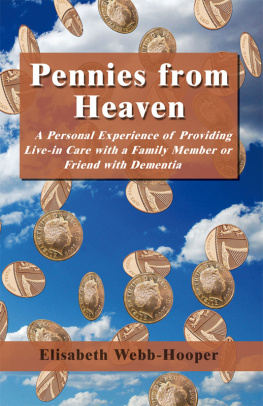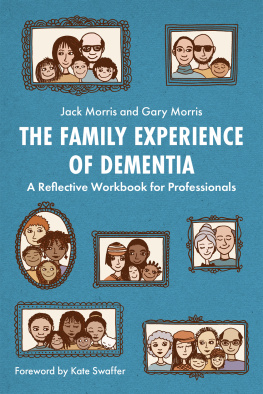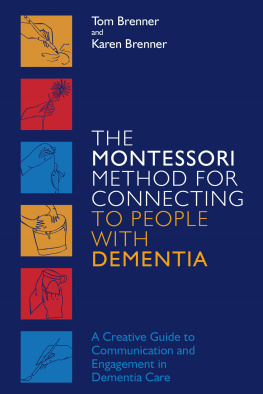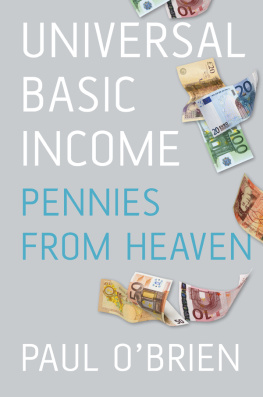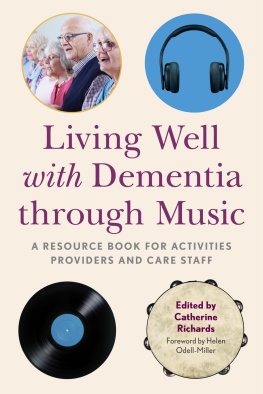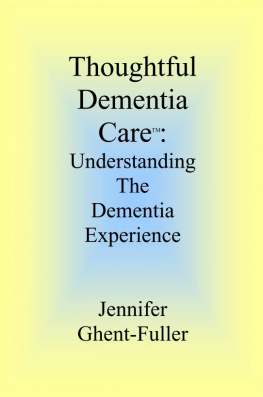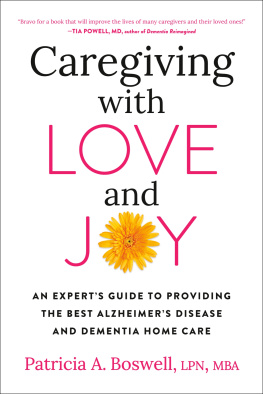
Pennies from Heaven
A Personal Experience of Providing Live-in Care with a Family Member or Friend with Dementia
Elisabeth Webb-Hooper
Published by

An Imprint of Melrose Press Limited
St Thomas Place, Ely
Cambridgeshire
CB7 4GG, UK
www.melrosebooks.co.uk
FIRST EDITION
Copyright Liz Webb-Hooper 2017
The Author asserts her moral right to
be identified as the author of this work
Cover by Melrose Books
ISBN 978-1-912333-00-4 Paperback
epub 978-1-912333-01-1
mobi 978-1-912333-02-8
All rights reserved. No part of this publication may be reproduced, stored in a retrieval system, or transmitted, in any form or by any means electronic, mechanical, photocopying, recording or otherwise, without the prior permission of the publishers.
This book is sold subject to the condition that it shall not, by way of trade or otherwise, be lent, re-sold, hired out or otherwise circulated without the publishers prior consent in any form of binding or cover other than that in which it is published and without a similar condition including this condition being imposed on the subsequent purchaser.
To my darling Pops,
I love you always
Acknowledgements
There are several people who I really want thank for their help throughout my time in writing Pennies From Heaven.
Firstly, my darling husband and soulmate, Jason, who has gone over and above in his exceptional caring role and support with my father. My two children for their love and understanding to a dearest Pops.
To Neil, Mike, Tom and Ken for always being a good friend to Dad.
To Rodger and Leah, you have been exceptional support to us all. Thank you from the bottom of my heart.
To Adam, Angela, Nam and Sabina, you are truly friends for ever, and thank you from Pops.
To Verline, Nikki and Maria for your help when we needed it.
To all my friends who were there for me Pam, Peter(Bro), Karen, Shan, Sue, Linda, Michelle and Hameeda. Too many to write here, but I love you all for being there when you were needed.
A huge thank you to Claire for advice with Carewatch and to Aunty Pam, Julia and Maria for making Pops smile over a Danish pastry!
Thank you also to SSAFA, Alzheimers Association, Carewatch and all carers and GPs who were there for us all.
Without your help, none of this would have been possible.
For Leah Ashby
During the publishing period of this book, our dear friend and mentor, Leah Ashby, sadly passed away.
Leah was special, dynamic, and without her strength and great support, over and above her field of duty, none of what we achieved would have been possible.
Leah was found by myself and husband in quite a unique set of events as I searched for help with getting support and advice to get Pops home from hospital after him being there for far too long. The circumstances were way out of our control as decision makers and social workers were away, and the day of Dad coming home seemed a real distant possibility; it was heartbreaking.
At the time, we found a really helpful advocate from the Alzheimers Association who did come to our first hospital meeting to plan Dads future, but she told us she was actually leaving for a new job role. We were heartbroken, that day, as we were told by all concerned that Dad could not come home. My POA was ignored. I was given Leahs phone number who would take on our case.
It was to be the best thing that could ever have happened to us all. After my prompt phone call, not being a person to let the grass grow under their feet, and having a long chat with Leah, our prayers had been answered. Leah was amazing. Her voice, her gorgeous accent made you feel calm and relaxed; she was a pocket rocket dynamo from the very first moment. I met Leah and she met Alex and all the family. We loved her, we felt safe. Leah was extremely knowledgeable and powerful. In fact, if she didnt know a small detail of case law, she would find out imminently. She challenged the top people when we knew they had given incorrect answers saying we couldnt cope and Dad could never come home. We proved everyone who said this wrong, and this is the reason for my book.
If you have a dementia-related illness, and it is manageable and practical to be nursed with the correct help and direction in your own home, with your loved ones around you, you should be allowed to do so.
It is a difficult time and a hard process for all concerned, but if it is the desire and last wish of anyone, then this should, and must be, respected.
Future Publications by Liz Hooper
Rainbows and Butterflies
Contents
Chapter 1
The early stages, with or without diagnosis
Personal experience
The early signs to observe with dementia are spotting unusual behaviour, such as perhaps putting items in strange places and forgetting where you have put them, or being unable to retain very basic information. Many of us can be oblivious to the early signs, especially when you live close to someone and their behaviour becomes normal.
My father suffered a small TIA transient ischaemic attack in other words, a mini-stroke. From early visits to the memory clinic, it can be a very frightening and lonely experience as much for loved ones looking after a precious family member as it is for those suffering with the condition. The most important thing is to get help as soon as possible when you feel there is a cause for concern. A visit to the GP is crucial, as the earlier a person is seen and diagnosed the better. This can be a difficult time as very often, dementia sufferers will be in denial; however, there is a way forward and it is so important to get things right to help protect our loved ones.
Help is available and that is why I have decided to write this book. I have learned the good, bad and the ugly and want to share all of this with others to enable people to make the correct decisions and be very aware of the care system available. Most of my experience has been good, although tinged with bad and the bad has caused so much unnecessary stress. I want to make others aware of how best to deal with issues that arise and not to feel isolated, or embarrassed to ask for help.
Basic things to look out for
Sometimes people can hallucinate and perhaps think they see shadows or things moving this can be a small crack in a wall or hole and is known as sundown syndrome. A shiny surface or road can look like water or flooding and can cause alarm.
Many people suffering vascular dementia forget where they are and can look lost and confused. It is important to try and ensure they are not left alone for reasons of safety.
Time and days all roll into one for sufferers. In my case, vascular dementia caused the whole family to be involved when it was the very early hours of morning and hearing the television or radio on was almost like reliving my teenage days, except it was a role reversal. Vascular dementia sufferers may think it is daytime when in fact it is two or three oclock in the early hours of the morning. The problem comes with there being no persuasion that it is night time and this causes huge frustration as I and my husband found out, as your loved one does not understand. People read articles telling you to keep calm. It is not so easy to keep calm when you are tired and you want to go to sleep as you have work and a family to care for the following day whereas your loved one can sleep all day, and this is the problem.
Next page
